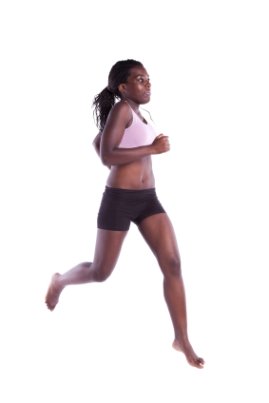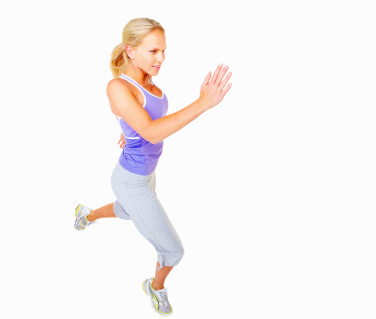Cross-Training for Runners - A Healthy Perspective
Cross-training is an often discussed topic in the running community.
There are as many runners as opinions it seems. In this section the following topics will be covered:
Types of Cross Training for Runners
Cross training is simply any kind of exercise which is not running. So whatever it is, you name it, when it is exercise, it is cross-training.
Cardiovascular cross-training is training that provides a good workout for your cardiac system, your heart, your lungs, etc.
Examples of cardiovascular cross training: cycling, pool running, swimming, soccer, walking, rowing, aerobics, spinning, elliptical, circuit training, etc, etc.
Non-cardiovascular cross training is any exercise that is not aimed at providing you with a cardio boost. The emphasis is usually more on strengthening specific muscles.
Examples of non-cardiovascular cross training: weight lifting, core conditioning, pilates, yoga, etc.

Specificity Principle and Cross Training
In relation to cross-training many runners point out the specificity principle. The specificy principle goes as follows:
So when you want to become a better runner, then run.
Want to become a better cyclist, then cycle.
Don't mix and match, it says.
And it can be argued that any training devoted to another activity than running, could better be replaced by running. Cross-training can therefore never be better than running. For a runner.
SIDEBARBy the way, the specifity principle also applies to running training itself. Different types of running training produce different results. Every type of run you do (long run, easy run, tempo run, intervals) serves different purposes. It stresses different systems within your body. Therefore, when training for a marathon you need a different kind of running training, than when training for an 800 meter race. |
The best, slightly funny argument against cross-training is the following:

Why Do Cross Training Then?
I used to agree with the specificity principle. When running training is replaced by cross-training, then you are not doing the maximum to become a better runner.
Over the years, I have learned more. And I started to see that the argument for the specificity principle was mostly made by elite trainers and elite runners. Let's face it. Elite runners are an exception. They are freaks of nature in their own way. Wonderful freaks, but freaks all the same.
For pretty much all of us mere mortals, there is absolutely time and space for cross training in our training schedule.
There are, after all, not many runners who are able to run 13 times a week. Who are elites or wanna-be-elites.
For you, cross training can be a fun, healthy activity with a good chance of it paying off in the end as well. I'll give you a few reasons why cross training is beneficial for you:
Cross-training can then be THE possibility for you to exercise more and not fall victim to a nasty injury.
Many of us get knee problems at some point in our running career. However when you do things like cycling which makes your upper legs stronger, or squats as part of a weight lifting regime, you can really target those upper legs. The extra muscle in your upper legs can help prevent knee injuries!
In fact, I now see weight training as almost a must in runners' training programs. Especially as you get older. And also when you are pushing into limits with your running. Weight training can help develop your overall muscle structure and make you a stronger, faster runner.
This is true for beginning runners, older runners and runners who often battle injuries. Basically everything that helps build up your endurance or strength can have a beneficial effect on your running.
When you are a bit more advanced, then cross-training can still be hugely beneficial. Developing your core will help improve your running technique and running economy which will make you faster.
And one particular study I have seen showed that people who did two core exercise sessions in addition to three running workouts per week, improved their running way more than people doing just three running workouts.
So, yes, cross-training is quite good for you, it:
... helps reduce your change of injuries....
... helps prevent injuries....
... provides variety in your training schedule....
... gives you a leaner physique...
... makes you a faster runner.
So, not too bad at all.... :)

Cross Training Routines I Do
Before you read ahead, don't do as I do. Well, better said: take a look at what I do, but don't necessarily copy me. Do whatever you like.
Running is fun and your training schedule should reflect that. If that means only running for you, fine. If that includes cross-training, please do. Below I'll just show you some specific cross-training exercises I do which might help give you an idea of exercises to do.
I generally run four times per week. In addition to that I do the following:
Regular abdominal exercises and stretching of the muscles around the lower back help in reducing the stress on my back.
And, as said before, research has shown that improved core strength leads to better running form and faster running, so good reason to do this type of training.
My wife Liz likes her aerobics classes. She especially likes Pilates. I did not get it. No sweating, no heavy breathing, no fun!
After only one month of doing Pilates she started feeling muscles in places where she did not even know she had them. The extra toning she achieved in a short time was amazing.
Yes, core conditioning, upper body training, whichever name you give it: it will make you leaner, stronger, better toned and faster.
I also do strength training two or three times per week in the gym. Think, squats, deadlifts, lunges, leg presses, shoulder press, barbell rows etc. Reasonably heavy weights with sets of 3-12 reps depending on where I am at in my training cycle.
Strength training is so important for us runners that I have decided to dedicated a full page to it. Please check out the Strength Training for Runners page for all you need to know about strength training.
- Sprints Do short sprints of 400 metres (as fast as possible), alternated with one or two minutes recovery cycling.
- Strength To work those upper legs I do the following: I stand on the pedals and cycle very slowly. I usually do a 1-2-3-4-5-4-3-2-1 workout; so first stand on the pedals one minute and cycle slowly, then two minutes, then three and so on. In between I do recoveries of one minute.
- Endurance Bit like interval running; do intervals of 800 to 1.000 metres at a pace below your fastest effort, but which makes your legs heavy enough to feel it. Do one to two minute recoveries in between.
Example of a 30-minute interval session
Cycle 2 minutes at a low resistance (I usually put it at 3 out of 8 on my exercise bike);
Then do 4 x 20 sec as fast as possible, with 40 sec recovery after each time;
Turn up resistance to 5 out of 8 and do 4 x 1 min as fast as possible with 2 min recovery after each time;
Turn up resistance to 8 out of 8, go stand on the pedals and do 2 x 4 min with 2 min recovery after each time.
The possibilities are endless on the bike!
This is not classified as exercise, but boy, do I feel my muscles after an afternoon of outside work!
Hope this section helped in getting a good view on cross-training.
Cross-training is good for you. Some might argue not as good as running.
But, unless you are a freak of nature, you need some cross-training in your schedule. Strengthen that core and hit those weights and give your running muscles a break by other cardiovascular exercise.
For pretty much all of us it is better than adding another running workout to our running program.
Do as much cross-training as you think you need. Not only to be a better runner necessarily.
After all, variety is an important key to mental freshness!
Home > Running Training > Cross Training for Runners




